INTERVIEW: How Prof Priye Iyalla-Amadi stopped NIS policy demanding husband’s consent before issuing passport to married women
A Neusroom exclusive interview with Prof Priye Iyalla-Amadi, who fought law preventing issuance of passport to married women without husband’s consent
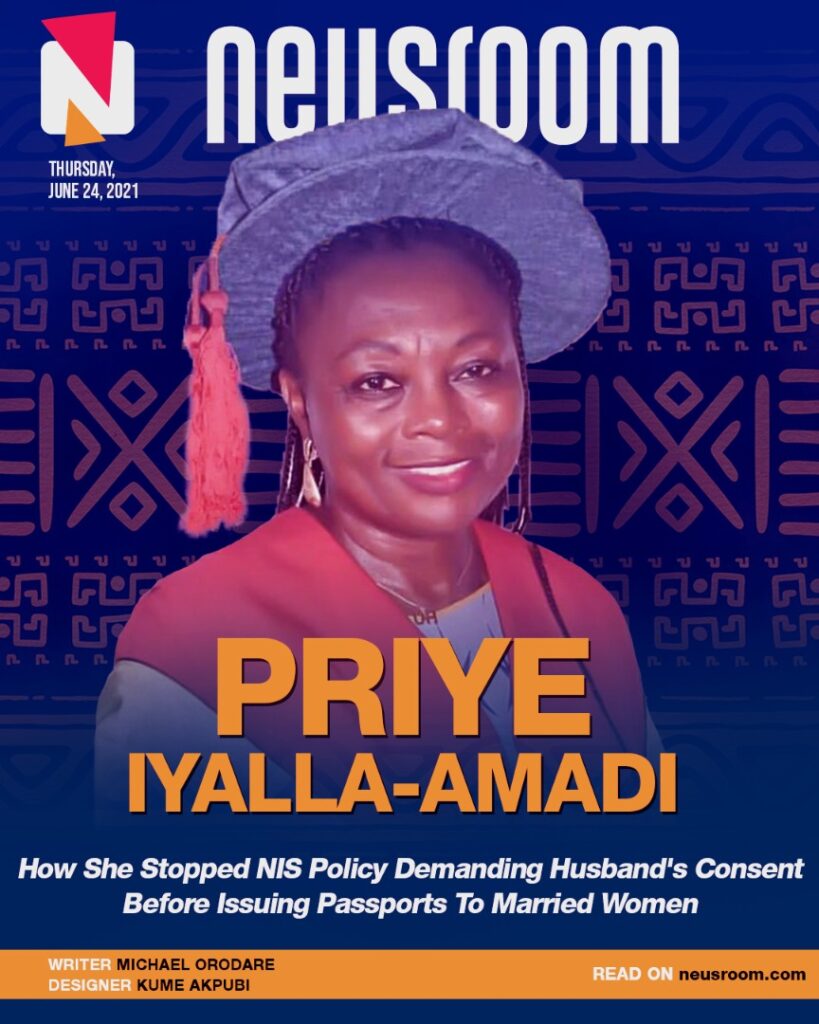
In 2009, Priye Iyalla-Amadi, a Professor of French and Translation Studies at the Ignatius Ajuru University, Port Harcourt, Rivers State wrote her name on the list of women taking actions to break institutional discriminations undermining the rights of Nigerian women. In her first media interview since her 2009 landmark court victory against the Nigerian Immigration Service (NIS) over its policy preventing the issuance of Nigerian passports to married women without husband’s consent, she shares the story behind her action with Neusroom‘s Michael Orodare.
02 June 2021
How did you get into a legal battle with the NIS?
Sometime in December 2018, the bag containing my international passport was stolen along with my car and I needed to travel to the US shortly afterwards. That meant that I had to get another international passport to enable me to apply for a visa. So I went to the Nigerian Immigration Service in Port Harcourt but couldn’t believe my ears when the officer I approached said one of the compulsory requirements was a letter of consent from my husband. I felt very miffed and protested but was told the requirement couldn’t be waived. They said it was to protect the home against wives who travelled out and didn’t return. I said that was a good reason and asked if that also applied to husbands who travelled out and abandoned their homes. There was much laughter and I was told not to be ridiculous.
Anyway, when sometime later I attended a programme organised by the American Corner in the then Claude Ake building in Port Harcourt one of the speakers, Barr. Busola Olagunju remarked that women only complain about discrimination but never go to court, I spoke up and said I would. I retained her on the spot and showed up in her office the following day to provide her with every information she needed about the case.
Did you at any point feel like backing out and just comply with their demand?
Not at all. I was quite determined to prosecute because I really felt miffed at being derided and treated like a minor.
How did you feel after the court verdict?
Unfortunately, at the time I was in the UK nursing my husband who had just undergone about three major surgeries. My attention was on getting him well enough to return to the country, so the whole euphoria completely passed over my head. My lawyer phoned and told me about the legal victory and that journalists were asking to interview me. I simply said, “Not now, I have to save my husband first.
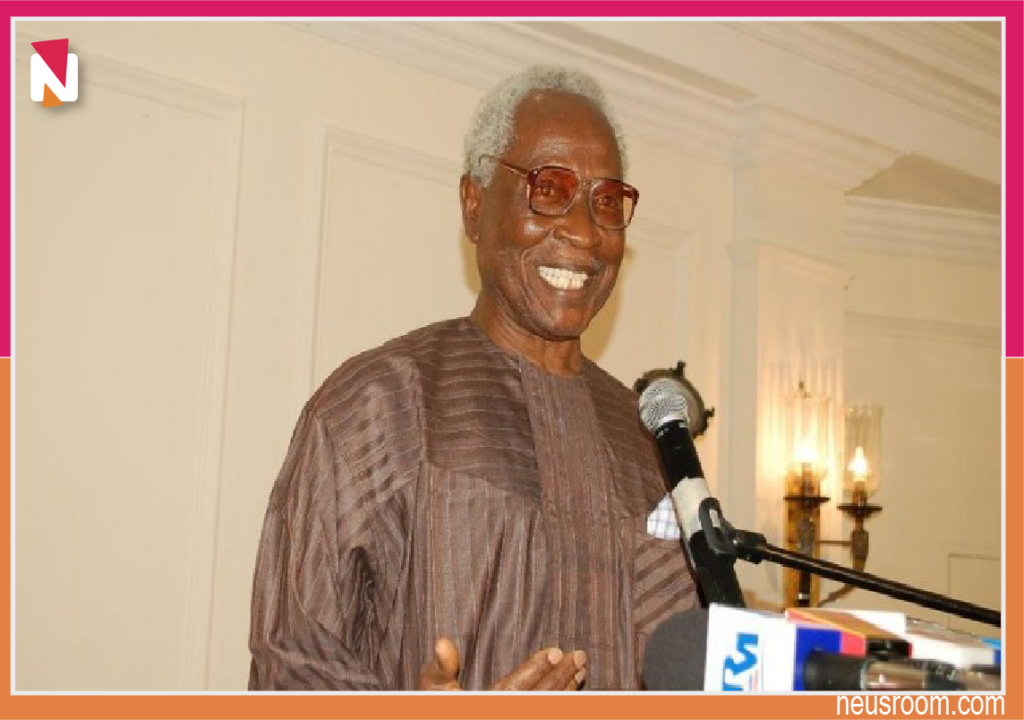
Captain Elechi Amadi, a former military officer was a writer whose best known novel is ‘The Concubine’. He died in June 2016.
What was your husband’s position on your decision to sue the NIS? And after the judgement?
That’s a very interesting question because he actually urged me to go to court! After the incident, I got back home fuming at the humiliation of being treated like a child in spite of the fact that I’m a full-grown adult, a mother and a responsibly engaged worker. He smiled laconically and said, “Well, if you don’t like it, you can always go to court. If you don’t fight for your rights, nobody will give them to you.” I said, “You know what? I might just do that.” But I didn’t quite know how to go about it until I attended the programme at the American corner and met the lady lawyer who agreed to take me on. By the way, I think I should add an important point here, she took me on for free. She didn’t charge me any fees. She said it was her contribution towards helping women fight discriminatory laws. God bless her.
My husband’s reaction after the judgement was quite predictable, he said, I told you the only way to get your rights would be to fight for them Congratulations! Anyway, like I said earlier, he was just recuperating at the time so we couldn’t go out to celebrate.
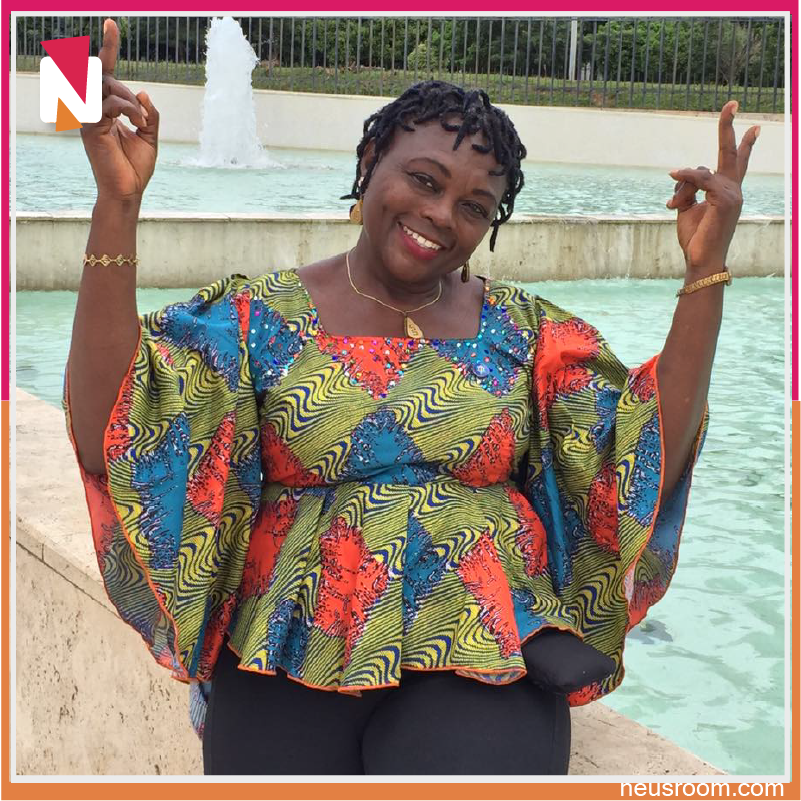
Prof Amadi believes women need to start taking action to challenge unfavourable laws. Photo: Facebook/Priye Iyalla-Amadi.
There are other laws still unfavourable to women. What do you think should be done to repel them?
Women should go to court and testify! Until we summon enough courage to represent ourselves and fight our battles for ourselves, we’ll remain oppressed. Those who are enjoying the privileges conferred by such oppression would never want to give them up unless compelled to do so. The other point is that legal services should be provided free of charge to make it possible. I know that there are some female legal bodies that say they stand up for women but I doubt that they’re effective or even sincere. For example, ever since my legal victory in 2009, not one female body has invited me to share my story by way of encouraging other women to take similar action to liberate themselves from male oppression where such exist. Even the female lawyer who represented me has not really received much recognition from her peers for her selfless representation. More attention seems to be given to First Ladies or those who are in the limelight. Those who really need representation are lowly who can’t afford legal fees or are made to believe that there’s nobody to help them, so they are blackmailed into submission.
What was growing up like and were you at any point a victim of gender discrimination while growing up?
I have always been the studious type so I have never really been that socially connected with any gender groups. But I’ve always been outspoken and I never tolerate discrimination. Expectedly, I often earned the nickname ‘Thatcher’ from my male counterparts.
.
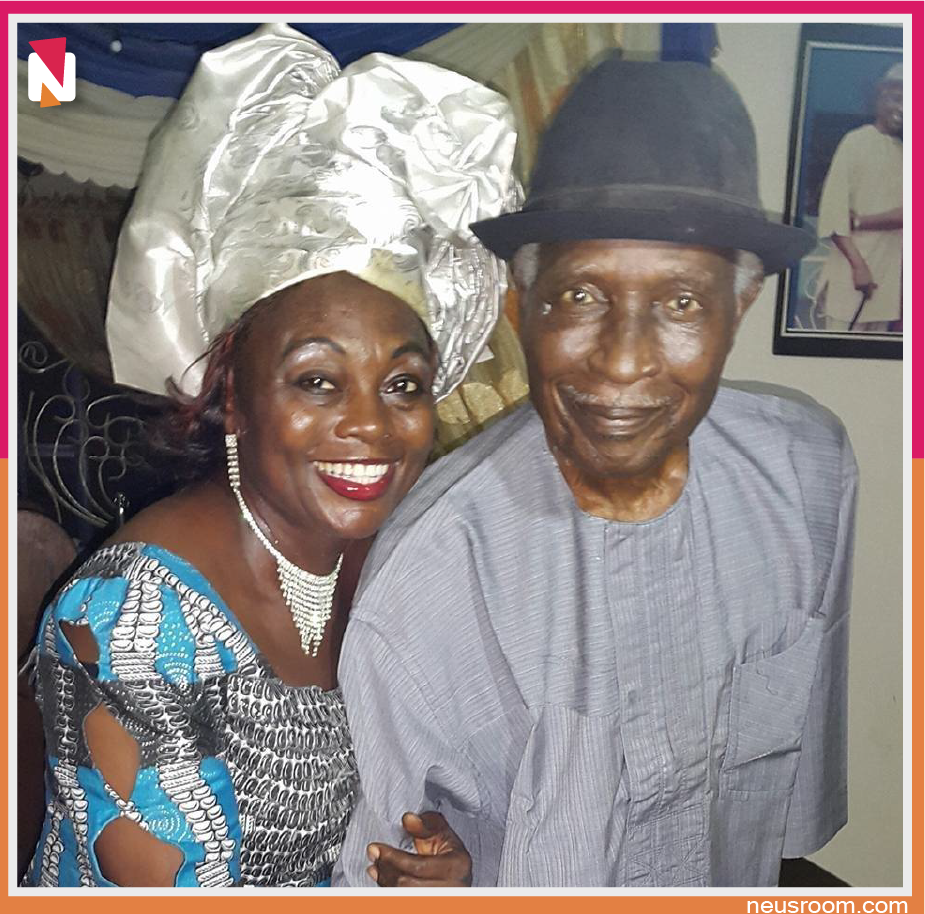
“I don’t quite believe in feminism and I don’t see myself as a feminist. I simply believe in being treated decently and respectfully.” – Prof Priye. Photo: Facebook/Priye Iyalla-Amadi
What are your thoughts on modern feminism and feminism as a movement?
To be honest with you, I don’t quite believe in feminism and I don’t see myself as a feminist. I simply believe in being treated decently and respectfully as a responsible member of the society we all share. I also believe in equal opportunities and fairness to all. It is the individual that should matter, not the gender. Not too long ago, my Vice-Chancellor appointed me as the acting dean of my faculty. I went in there and, working assiduously with all my male and female colleagues, initiated quite a number of projects which improved the quality of life for all staff and students in the faculty. It wasn’t about having a female dean, it was more about having someone who could administer the faculty and bring about improvement which would benefit everyone. You don’t have to be any particular gender to accomplish that. So my take is, prove your worth as a responsible individual and the world will take you seriously. If you don’t like the treatment you’re getting, then be bold enough to protest where your voice will be heard. That’s what I did.
What are your thoughts on the series of women’s movements that have shaped Nigeria’s history, from Aba women protests to Funmilayo Kuti’s protests in Abeokuta and the recent ENDSars protests championed by ladies?
Well, like I said before, I’m not one for genderised group actions. But I recognise that there are times when that is needed. And as a woman, I am quite grateful to the likes of Funmilayo Kuti who through their boldness and bravery, got women to be taken more seriously. But having done that, it is now up to individual women to prove their worth and make their mark in their chosen areas of endeavour. As you well know, we now have female mechanics, bus drivers, engineers, ambassadors, pilots, etc. They each had to achieve those feats through concerted individual efforts.
What inspired you to choose a career in academia and language studies?
Like I said before, I’ve always been a bookworm. I’m the type who has a permanent room in the library. As a matter of fact, I had a private (almost permanent) cubicle at the University of Ibadan when I was doing my doctoral studies there. A fact that enabled me to conclude my studies in record time! And any city I visit, I get to know the library first. I have library cards for libraries in the UK, US, France, Switzerland, and so on. It’s just my passion to read. I think I’m a researcher by nature. And I love word games! My late husband used to be fascinated by the fact that I solve word puzzles to lull me to sleep. He used to exclaim, ‘But that must be very strenuous!’ And I would always reply, ‘Not for me!’
As for choosing language studies, I’ve always been in love with the French language, right from my secondary school days. I was actually a science student and I had high credits in Biology, Chemistry, Physics and Mathematics but I chose French over Pharmacy during my admission into the University in 1980. It was my dream to visit France and see the Eiffel Tower and other French monuments. I’m happy to report that I’ve since accomplished that dream many times over!
As someone who has successfully combined family life and career advancement, how do you feel about the world ladies are living in as professional women, compared to the one you grew up in?
I happen to have two beautiful daughters who are self-confident and who have definite ideas about what they want to do. I let them know that they are in charge of their world and have to be fully responsible for their choices. And that is what I’d like to tell all my fellow women out there: the world would always take you on your own terms. I don’t believe in favouritism or preferential treatment – test me for the job, and if I’m found worthy, employ me. I’m actually a meritocrat at heart. If you can do the job, you’re my man (or woman). I don’t care if you’re from Timbuktu or the moon. The fact of being a woman has never really stopped me from getting what I put in the effort to get, except for my international passport which I still got because I put in the right effort to remove the man-made obstacle that was placed in my way. I believe that the other thing that has shaped my philosophy of life is my religion ECKANKAR. One of the basic beliefs of Eckankar is that you work for everything you expect to get. If you want promotion or advancement at work, then put in the requisite effort. Don’t expect one godfather somewhere to push you up. And so I believe in and preach hard work and kindness wherever I go. What you put into life is what you get out of it.
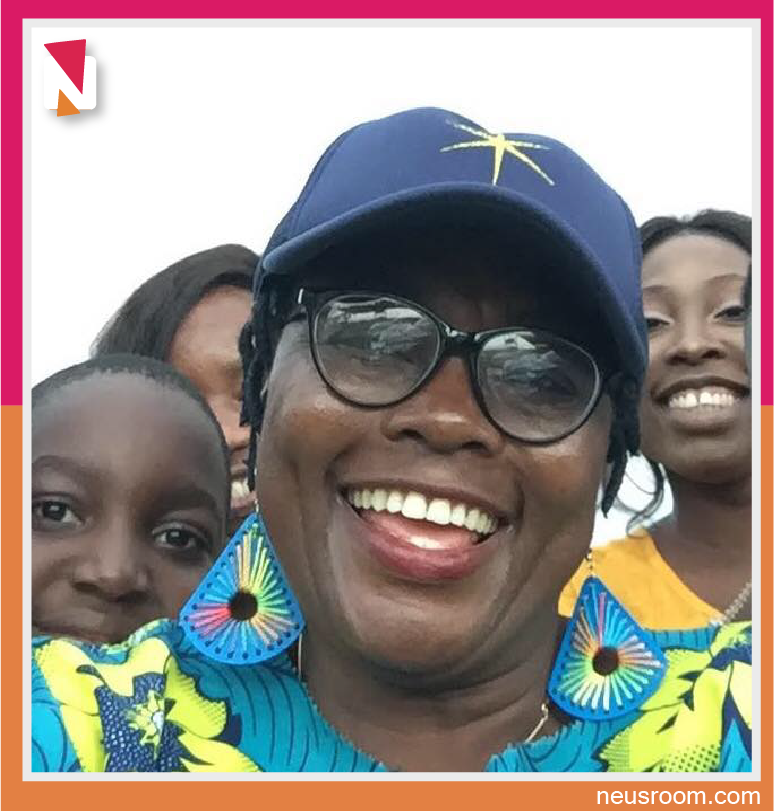
“I have two beautiful daughters, and I let them know that they are in charge of their world and have to be fully responsible for their choices”. Photo: Facebook/Priye Amadi.
You’ve managed to keep your personal life out of the public eye.
Thank God that one can still have privacy in some areas! Actually, I’m a rather private person and would love to keep it that way. I’ve also trained my children to make their careers for themselves and not rely on any inherited wealth. I share one of the secret joys of my late husband – to be able to roam the streets anonymously and stop to buy roasted corn and ‘ube’ whenever the fancy takes me! But seriously, I believe parents, especially mothers, should train their male children to appreciate their female siblings by exposing them equally to housework as they grow up. The discriminatory feeling starts from that point when the boys feel that it is condescending to do what the weaker sex does – and who told them that girls are weaker anyway? If their parents didn’t tell them, then nobody else should.


I hope this story inspires other women to take personal action!